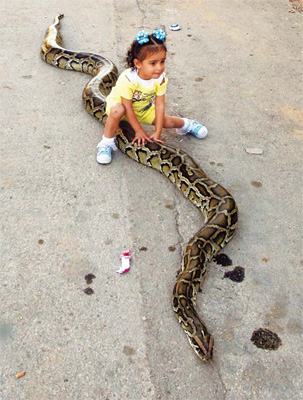Odd News
Pythons are part of the family
(China Daily)
Updated: 2010-10-22 07:27
 |
Large Medium Small |
RAMALLAH, Palestinian Territories - A lot of fathers would prefer their 2-year-old daughters not to ride a giant Burmese python down the street like a pony - but not Jamal Amwasi of Ramallah.
The 35-year-old Palestinian civil servant is the proud owner of more than a dozen snakes, including several large pythons, all of which live in a shed a few meters from his home in the occupied West Bank.
 Two-year-old Nathalie Amwasi rides a 3-meter pet python in the West Bank city of Ramallah. [Photo/Agencies] |
"These snakes have become part of the family. Every morning and every night I check up on them and feed them," he says.
Amwasi stands out in the West Bank, where pets of any kind are rare and snakes are mostly viewed as farm pests. His experience has made him the leading local authority on the reptiles.
As a boy, Amwasi would hunt birds and gazelles in the surrounding hills, a pastime that eventually led him to snakes.
In addition to collecting local snakes, he has imported the Burmese pythons from a trader in Israel. He knows all the different species by their Hebrew names.
Some 40 species of snake inhabit Israel and the West Bank and around 10 of them are venomous, including the Sahara horned viper, the Palestinian viper, the saw-scaled viper and the long, black burrowing asp.
Amwasi used to own around 20 venomous snakes but got rid of them for fear that they might bite one of his children or a neighbor. He says he turned them loose in a remote area far from the city.
He has taught himself how to treat various bites, however, and once helped doctors administer an antivenom to a 10-year-old boy who had been bitten by a snake in a village near Ramallah.
"I got a call from a friend who was visiting a patient at the hospital, and he said there was a critical case, a child the doctors said had been bitten by a snake." He raced to the hospital and asked the boy where he was from.
"I know where the snakes are in this area, so I knew the kind of poisonous snake that was in that village, as well as the antivenom," he says. Within three days, the child recovered fully.
Now he regularly gets calls from people asking him to remove troublesome snakes. If they are venomous he kills them. If not, he keeps them.
Back at home, his children enjoy the pet pythons. Ibrahim, 13, is responsible for feeding the three-meter snakes when his father is away.
"I'm not afraid of them at all," he says proudly.
Two-year-old Natalie used to be afraid, but now she kisses them and rides on their backs as they slither down the road in front of her house.
"I'm thinking about making her a saddle,' Amwasi says, as neighbors and passers-by stop and stare.
He raises chickens, ducks and rabbits in order to ensure a constant food supply for his pets, and says he fed a lamb to one of the pythons two weeks ago.
The lamb, he admits, was hardly bigger than Natalie, but he brushes aside concerns about her safety.
"Before they eat any animal they inspect it and sniff it and taste it," he says. "Anyway, they don't eat people."
Other snake handlers disagree. Yonatan Vronski, a longtime snake collector who works with Israel's Nahariya Zoo, says Burmese pythons, though usually docile, can be deadly.
"This is not a snake that one person can handle safely," he says. "If you leave your kid alone with a snake to go in and make coffee, by the time the water boils the kid can be dead."
Amwasi has had his own brushes with the snakes, but insists the python bite scar on his left hand was simply a misunderstanding. "It thought my hand was a chicken."
Agence France-Presse